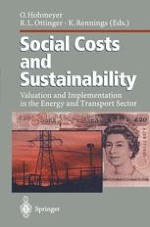1997 | OriginalPaper | Chapter
The Role of Technical Progress in Economic Models of Environmental Policy
Author : Irene Peters
Published in: Social Costs and Sustainability
Publisher: Springer Berlin Heidelberg
Included in: Professional Book Archive
Activate our intelligent search to find suitable subject content or patents.
Select sections of text to find matching patents with Artificial Intelligence. powered by
Select sections of text to find additional relevant content using AI-assisted search. powered by
Pollution taxes, especially broad-based ones such as carbon taxes, are said to impose a cost on the economy by reducing economic activity and growth. There are several mechanisms by which this is supposed to happen. This paper explores one line of argument: the contention that carbon taxes (which would increase energy prices) slow down technical progress and therefore lead to a reduction in GDP growth. This argument partially rests on the results of some econometric analyses which depend on a particular mathematical specification of technical progress. These same results are then used in a model to simulate the effect of environmental taxes on the economy. This paper argues that such a specification is not a good depiction of reality and that it is counterproductive for environmental policy making: First, it leads us to believe that environmental policy may be more costly than it actually would be. Second, this treatment of technical change is passive, implying that we cannot influence its nature and direction. More generally, this example is meant to provide a warning against a too easy reliance on economic models in environmental decision making.
